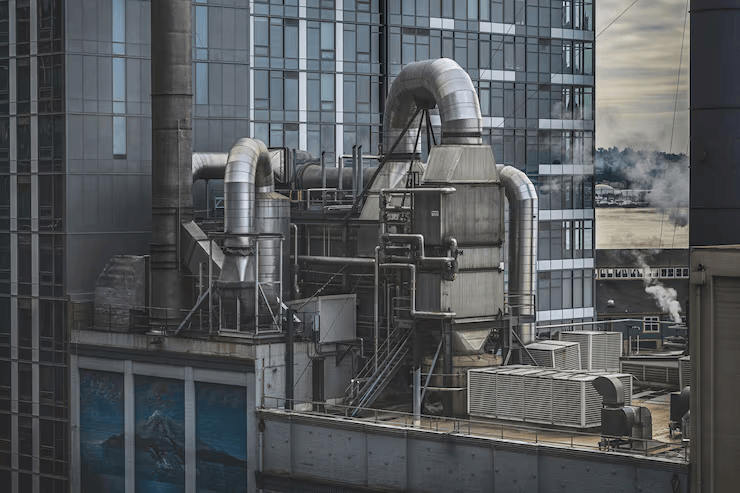Industrial chillers and cooling systems are critical components in modern manufacturing, production, and process industries. They regulate temperature, ensure equipment longevity, and maintain optimal operating conditions for sensitive machinery. Understanding the types, functionality, and technological advancements of industrial chillers can help engineers, plant managers, and maintenance teams make informed decisions that enhance operational efficiency and reduce energy costs.
What Are Industrial Chillers and Cooling Systems?
Industrial chillers are mechanical systems designed to remove heat from liquids or gases and maintain a desired temperature in industrial processes. Cooling systems work in tandem with chillers to distribute cold fluid to equipment or processes, ensuring temperature-sensitive operations continue smoothly.
Industries that rely heavily on chillers include:
-
Manufacturing and production plants
-
Plastic and chemical processing
-
Food and beverage industries
-
Pharmaceutical and healthcare sectors
-
HVAC systems in commercial and industrial buildings
Without effective cooling, machinery can overheat, leading to reduced efficiency, higher energy consumption, and potential equipment failure.
Importance of Industrial Chillers
Industrial chillers are essential because they:
-
Prevent Equipment Overheating: Overheated machinery can lead to breakdowns, production delays, and safety risks.
-
Ensure Product Quality: Certain manufacturing processes, such as plastics or food processing, require precise temperature control.
-
Reduce Energy Costs: Efficient chillers optimize cooling performance while minimizing power consumption.
-
Extend Equipment Lifespan: Maintaining ideal operating temperatures reduces wear and tear on machinery.
-
Support Safety Compliance: Proper cooling prevents hazardous conditions caused by overheating in industrial setups.
Types of Industrial Chillers
Several types of industrial chillers are available to suit different operational requirements:
Air-Cooled Chillers
Air-cooled chillers use ambient air to cool the refrigerant. They are ideal for smaller facilities or environments where water supply is limited.
Benefits:
-
Easy installation and lower water usage
-
Low maintenance compared to water-cooled chillers
Water-Cooled Chillers
Water-cooled chillers use water as a medium to remove heat from the system, often paired with cooling towers. They are more efficient for large-scale industrial operations.
Benefits:
-
High energy efficiency
-
Suitable for continuous, high-capacity cooling
Screw Chillers
Screw chillers use rotary screw compressors for medium- to large-capacity cooling needs. They are reliable for industrial applications requiring consistent cooling.
Scroll Chillers
Scroll chillers use scroll compressors and are commonly used for medium-capacity applications where quiet operation and efficiency are priorities.
Absorption Chillers
Absorption chillers use heat energy (steam or hot water) instead of electricity to drive the cooling process, making them suitable for facilities with excess waste heat.
Features of Modern Industrial Chillers
Modern chillers and cooling systems are equipped with advanced features to improve performance and sustainability:
-
Digital Control Systems: Enable precise temperature regulation and monitoring.
-
Energy Efficiency: Smart compressors and variable-speed drives reduce energy consumption.
-
Eco-Friendly Refrigerants: Low-GWP (Global Warming Potential) refrigerants reduce environmental impact.
-
Remote Monitoring: IoT-enabled chillers provide real-time data and predictive maintenance alerts.
-
Durability and Reliability: Sturdy components and corrosion-resistant materials extend system lifespan.
Benefits of Using Industrial Chillers
-
Optimized Production: Maintain consistent process temperatures for higher product quality.
-
Lower Operational Costs: Energy-efficient chillers reduce electricity bills.
-
Improved Safety: Prevent machinery overheating and hazardous incidents.
-
Sustainability: Reduced energy use and eco-friendly refrigerants support environmental goals.
Recent Trends in Industrial Chillers (2024–2025)
The industrial cooling sector is evolving with innovations aimed at energy efficiency, sustainability, and automation:
-
IoT Integration: Smart chillers provide real-time monitoring, predictive maintenance, and remote control capabilities.
-
Advanced Heat Exchangers: Microchannel and plate heat exchangers improve cooling efficiency while reducing space requirements.
-
Variable Speed Technology: Compressors and pumps adjust output based on demand, saving energy.
-
Eco-Friendly Refrigerants: Adoption of R-1234ze, R-513A, and other low-GWP refrigerants is increasing to comply with environmental regulations.
-
Compact and Modular Designs: Portable and modular chillers facilitate flexible installation and on-site cooling solutions.
| Feature | Standard Chillers | Modern Chillers (2024) |
|---|---|---|
| Energy Efficiency | Medium | High (VSD & smart controls) |
| Refrigerant Type | R-134a/R-22 | Low-GWP, eco-friendly |
| Control System | Manual | Digital/IoT-enabled |
| Maintenance Requirement | Frequent | Reduced, predictive maintenance |
| Installation Flexibility | Fixed | Modular, portable |
Tools and Resources for Chiller Management
-
Software: CAD systems for layout planning, and chiller management software for monitoring performance.
-
Maintenance Apps: Track service schedules, monitor refrigerant levels, and log operational data.
-
Vendor Websites: Compare models, technical specs, and energy ratings.
-
Government Resources: Energy efficiency guidelines, standards, and subsidy programs for industrial cooling solutions.
FAQs About Industrial Chillers
Q1. What capacity chiller is suitable for my facility?
A: Chiller capacity depends on your process heat load, production scale, and environmental conditions. Consult with manufacturers for load calculations.
Q2. Are industrial chillers energy-efficient?
A: Modern chillers with variable-speed drives, smart controls, and eco-friendly refrigerants can reduce energy consumption by up to 30%.
Q3. How often should industrial chillers be serviced?
A: Routine maintenance is recommended at least every 6 months, with major overhauls every 1–2 years, depending on usage.
Q4. Can chillers be used in outdoor conditions?
A: Yes, air-cooled chillers are suitable for outdoor installation, but proper shading and ventilation improve efficiency and longevity.
Q5. What industries benefit most from industrial chillers?
A: Manufacturing, pharmaceuticals, food & beverage, plastics, chemical processing, and HVAC-heavy commercial facilities all rely on industrial chillers.
Final Thoughts
Industrial chillers and cooling systems are indispensable in modern industrial operations, ensuring machinery longevity, energy efficiency, and process stability. Selecting the right type of chiller, staying updated with modern features, and implementing predictive maintenance practices help businesses achieve consistent production quality and operational cost savings. By investing in advanced, sustainable, and IoT-enabled cooling solutions, industries can enhance efficiency, safety, and environmental compliance for years to come.